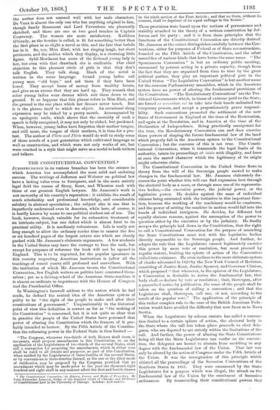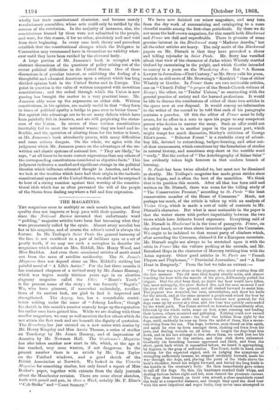THE CONSTITUTIONAL CONVENTION.*
JURISPRUDENCE in its various branches has been the science in which America has accomplished the most solid and enduring success. The writings of Jefferson and Webster on political law have a lasting value even to foreigners, and in the more strictly legal field the names of Story, Kent, and Wheaton rank with those of our greatest English lawyers. Mr. Jameson's work is
not unworthy of his country's reputation ; it exhibits the result of much scholarship and professional knowledge, and considerable subtlety in abstract speculation ; the subject also is one that is imperfectly understood even in America, while here, of course, it is hardly known by name to one political student out of ten. The book, however, though valuable for its exhaustive treatment of an intricate subject, has one defect which is almost fatal to its practical utility. It is needlessly voluminous. Life is really not long enough to allow the ordinary reader time to master the five or six hundred pages of the largest octavo size which are closely packed with Mr. Jameson's elaborate arguments. A few students in the United States may have the courage to face the task, but except for purposes of reference the book will not be opened in England. This is ta be regretted, for the popular ignorance in this country respecting American institutions is (after all the teachings of recent years) still profound and marvellous. With the institution of which Mr. Jameson treats, the Constitutional Convention, few English writers on politics have concerned them- selves ; yet as a driving-wheel of the American State-machine it is almost co-ordinate in importance with the Houses of Congress and the Presidential Office.
In Washington's farewell address to the nation which he had made, he defined the central idea of the American system of polity to be "the right of the people to make and alter their constitutions of government." Unquestionably in the historical point of view this definition is correct as far as "the making of the Constitution" is concerned, but it is not quite so clear that in practice the people of the United States have possessed that power of altering the Constitution which the framers of it pro- bably intended to bestow. By the Fifth Article of the Constitu- tion the reforming power in the Federal State is thus :—
" The Congress, whenever two-thirds of both Houses shall deem it necessary, shall propose amendments to this Constitution, or, on the application of the Legislatures of two-thirds of the several States, shall call a convention for proposing tho amendments, which in either case shall be valid to all intents and purposes, as part of this Constitution, when ratified by the Legislatures of three-fourths of the several States, or by conventions in three-fourths thereof, as the one or the other mode of ratification may be proposed by the Congress, providad that no amendment which may be made prior to the year one thousand eight hundred and eight shall in any manner affect the first and fourth clauses
• The Constitutional Convention its History, Powers, and Modes of Proceeding. By John Alexander Jameson, Judge of the Superior Court of Chicago, and Professor of Constitutional Law in the University of Chicago. London: Low and Co.
in the ninth section of the First Article ; and that no State, without its consent, shall be deprived of its equal suffrage in the Senate."
These provisions were based upon the notions of permanence and stability attached to the theory of a written constitution by Jef-
ferson and his party ; and it is from these principles that the functions of the Constitutional Convention are directly derived.. Mr. Jameson at the outset distinguishes carefully between the Con- ventions, either for purposes of Federal or of State reconstruction, founded on the Fifth Article of the Constitution, and the other assemblies of various kinds that have borne the same name. "The Spontaneous Convention" is but an ordinary public meeting, summoned by persons acting in a private capacity, though front the fact that they are organized from time to time by the great political parties, they play an important political part in the United States. "The Legislative Convention" is but another namo for the common Parliamentary assemblies, which in the American system have no power of altering the fundamental provisions of the Constitution. "The Revolutionary Conventions" are the Pro- visional Governments which, in times of extreme peril to the State, are forced ex necessitate rei to take into their hands unlimited but, temporary powers, and accept a proportionately grave responsi- bility. Such conventions promoted the settlement of the new frame of Government in England at the time of the Restoration, and again at the Revolution, and in America at the thne of tho Declaration of Independence. Being practically omnipotent for the time, the Revolutionary Convention can and does exercise those powers of shaping the future fundamental law of the land which properly fall in the American system to the Constitutional Convention ; but the converse of this is not true. The Consti- tutional Convention, when it transcends the legal limits of its authority, taints its proceedings al) initio with illegality, and loses at once the sacred character which the legitimacy of its origin might otherwise claim.
The Constitutional Convention in the United States flows in theory from the will of the Sovereign people moved to make changes in the fundamental law. Mr. Jameson elaborately dis- cusses the point whether this will can find expression best through the electoral body as a mass, or through some one of its representa- tive bodies,—the executive power, the judicial power, or the legislative power. He decides against the mass of individual citizens being entrusted with the initiative in this important func- tion, because the working of the machinery would be cumbrous, and the power of setting the machine in motion would fall into the hands of individual intriguers. He decides, for different but equally obvious reasons, against the assumption of the power in question either by the executive or by the judiciary. He finally accepts the principle laid down in the Constitution, that the right to call a Constitutional Convention for the purpose of amending the State Constitutions must rest with the legislative bodies directly responsible to the Sovereign people. And further, he adopts the rule that the Legislature cannot legitimately exercise this power by mere vote or resolution, but must proceed by regular statute, limiting the sphere of action of the Convention called into existence. He even inclines to the more elaborate system of checks advocated in 1820 by the New York Council of Revision, consisting of Justice Kent, Justice Spencer, and Governor Clinton, which proposed "that whenever, in the opinion of the Legislature, a Convention is desirable to revise the fundamental law, that body shall so declare by vote or resolution ; that, thereupon, after a prescribed notice by publication, the sense of the people shall be taken on the question of calling a convention ; and that the Legislature shall, thereupon, call one, or not, according to the result of the popular vote." The application of the principle of this rather complex rule to the case of the British American Fede- ration would have avoided the difficulty that now faces us in Nova Scotia.
When the Legislature by solemn statute has called a conven- tion limited to a certain sphere of action, the electoral body in the State where the call has taken place proceeds to elect dele- gates, who are deputed to act strictly within the limitations of the call. And further, the power of altering the State Constitutions being all that the State Legislatures can confer on the conven- tion, the delegates are bound to abstain from meddling in any degree with the fundamental law of the Union. That law can only be altered by the action of Congress under the Fifth Article of the Union. It was the transgression of this principle which vitiated all the proceedings of the Secession Conventions of the Southern States in 1861. They were summoned by the State Legislatures for a purpose which was illegal, the attack on the fundamental law of the Union by the enactment of Secession ordinances. By transcending their constitutional powers they wholly lost their constitutional character, and became merely revolutionary assemblies, whose acts could only be ratified by the success of the revolution. In the majority of instances, also, the constitutions framed by them were not submitted to the people, and were, for this reason, if for no other, absolutely null and void from their beginning. In every case both theory and precedent establish that the constitutional changes which the Delegates in Convention may recommend have in themselves no validity what- ever until they have been ratified by the electoral body.
A large portion of Mr. Jameson's book is occupied with abstract discussions of the questions of policy arising out of the recent political difficulties in the United States. One of these discussions is of peculiar interest, as exhibiting the feeling of a thoughtful and educated American upon a subject which has long divided opinion both in the United States and in Europe. The point in question is the value of written compared with unwritten constitutions ; and the ordeal through which the Union is now passing has brought the matter to a very practical issue. Mr. Jameson ably sums up the arguments on either side. Written constitutions, in his opinion, are mainly useful in that "they form in times of political apathy a bridge to pass over to better times." But against this advantage are to be set many defects which have been painfully felt in America, and are still perplexing the states- men of the Union. In course of time written constitutions inevitably fail to meet the national wants; they are hard and in- flexible, and the operation of altering them for the better is beset, as Mr. Jatnesou's book abundantly proves, with many difficulties and some serious dangers. On the whole, we agree with the judgment which Mr. Jameson passes on the advantages of the un- written and elastic systems of national law. " They are likely," he says, "at all times to be more correct expressions than any others of the corresponding constitutions considered as objective facts." 'This judgment indicates a marked and significant change in the political theories which influence educated thought in America, and when we look at the troubles which have had their origin in the inelastic constitutional system of the United States, we shall not be surprised to hear of a strong reaction against that worship of the constitu- tional idols which has so often prevented the will of the people .of the States from finding anywhere a full and free expression.



































 Previous page
Previous page